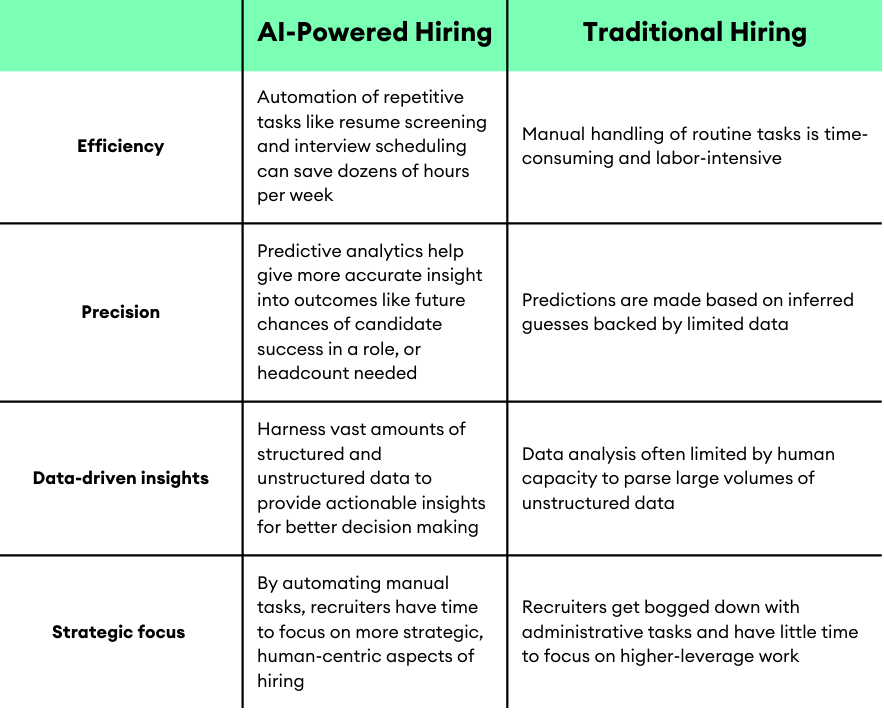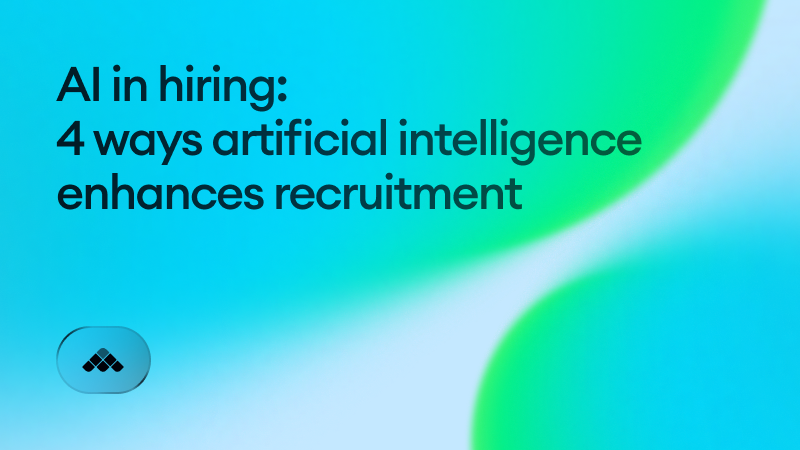Traditional hiring processes have long been bogged down by time-intensive inefficiencies. Think: scouring the internet for candidate profiles that may or may not be a fit, spending hours writing up interview notes, dealing with manual scheduling messes. The list goes on.
This leaves recruiters with less time to focus on the higher-leverage, more strategic parts of the job that they’re always saying they wish they could spend more time on.
But artificial intelligence (AI) is already changing the game, presenting a modern fix to these age-old challenges. With its ability to automate repetitive tasks, AI doesn't just conserve your precious time as a recruiter. It also gives you deeper data and insight into what’s going on, makes hiring more consistent and efficient, and even helps reduce human biases.
The end result is empowered recruiters who can shift their focus towards more strategic parts work, while automating traditionally tedious tasks.
This article examines AI’s promise to revamp four key hiring quagmires:
- Interview notetaking and summaries
- Call scheduling and poor candidate experiences
- Candidate assessments and debrief calls
- Interviewer training and hiring manager alignment
Key takeaways
- Artificial intelligence can completely lift the typical time and energy burdens on recruiters, leaving more time for deep analysis and relationships.
- AI also makes candidate assessments and trend analysis more evidence-based, and removes subjectivity and gut feel.
- Those talent teams not embracing AI in their processes will be left behind. This is now an essential tool and skill for recruiters to master.
The AI-driven hiring process
Many technologies underpin the AI innovations we’ve seen in the past year and beyond. While there’s no need to go too deep into the technical details, here’s a quick primer on some of the key applications that make AI such a powerful technology.
- Machine learning (ML) recognizes patterns and learns from data iteratively without human intervention. Think of it like an observant, always-learning companion that grows sharper with each recruitment cycle.
As an example, ML can scan through thousands of resumes much faster than a human ever could, plucking out the ones that best match your role requirements. ML is also the technology that powers video assessment software to recognize candidates’ facial expressions, body language, and tone of voice. - Predictive analytics analyzes current and historical data to project potential future occurrences. In recruitment, this could translate into forecasting a candidate's success in a given role based on their past performance and current competencies.
It's like having a crystal ball that provides insight into a candidate’s potential compatibility with a role, before they even step through the door. - Natural Language Processing lets computers understand human language as it’s naturally spoken and written. This helps power tools like ChatGPT and virtual chat bots that enable more seamless candidate communication at scale.
Together, these technologies have the power to redefine the hiring process by turning vast amounts of data into actionable insights and transforming the way we interact with job candidates.
How AI enriches the hiring process: 4 key areas
AI hiring tools have the power to level up the recruitment process at every step. As Recruiting Brainfood founder Hung Lee says, “I think almost every aspect of recruiting is going to be infused with AI. I see it as that universal condiment you can stick on any part of the dish."
For now, let’s focus on four tangible, practical examples of how artificial intelligence can transform different parts of the hiring process.
1. AI for interview notes and summaries
The clearest and most obvious use case for AI in recruiting is to cut down on the repetitive tasks that eat up talent teams’ time. You’re conducting a high number of interviews per day, each requiring detailed notes, concise summaries, and key takeaways for your own reference and your colleagues.
But all that typing is now simply not required. You can use AI to automatically generate interview notes and summaries by transcribing conversations and highlighting the most relevant points. AI tools capture candidate responses in real time and organize them into structured notes.
These summaries often include key skills, experience, culture fit indicators, and even sentiment analysis. Recruiters can then quickly review highlights without replaying recordings or reading lengthy transcripts. This not only saves time but also reduces the chance of bias, since AI provides consistent note-taking across all interviews.
Key benefits include:
- Faster turnaround for hiring decisions through instant summaries
- More consistent and objective note-taking across candidates
- Less administrative burden for recruiters and hiring managers
- Easier collaboration with stakeholders by sharing clear summaries
- An improved candidate experience since recruiters stay engaged instead of distracted by note-taking (more on this shortly)
And critically, with notes ready near-instantly, you can move quickly on to the assessment and decision phase of the hiring funnel.
2. AI in candidate assessment
While it may be considered somewhat controversial, AI can play a role in aiding candidate assessment. It’s particularly helpful as the initial filter in sifting through candidate profiles, or to provide more data points and context to effectively make judgements on whether candidates are the right fit later in the recruiting process.
Annie Jackson, Head of Talent Acquisition at Cleo, explains that AI helps give her team the tools to help more effectively assess candidates, not to necessarily do the assessing itself. Cleo uses AI to help screen resumes from job applicants more efficiently, generate tailored interview questions and job descriptions, and to create standardized rubrics for objective evaluation.
It’s also valuable in the debrief phase, when it’s time to make the hire or no hire call. AI flags interview evidence that fits your key hiring criteria, and ensures you’re not overlooking useful candidate responses.
More globally, artificial intelligence checks that the right questions are asked during interviews, and that candidates are getting a fair, consistent interview process.
The bottom line is that while AI can be a helpful companion, the final hiring decision should always hinge on human judgment. As our co-founder and CEO, Siadhal, explains, “AI can give you much higher resolution, higher definition ways to look at human beings but that still leaves you to judge what the requirements are for a role and what you care most about.’”
3. How AI enhances the candidate experience
While you might think that AI could risk harming the candidate experience—that applicants could be wary—it generally makes the process more enjoyable. First and foremost, by making recruiters’ lives easier.
AI gives them the freedom to focus more on each candidate in the moment. During intakes, interviews, and debriefs, recruiters don’t need to worry about frantically typing, trying to capture everything a candidate is saying. With the assurance that the AI is taking perfect notes for them, recruiters can instead focus on being present and building relationships with candidates.
- Meera, Head of People @ Flash Pack
Some recruitment teams are also using sourcing bots to help handle initial interactions with candidates. These AI tools can answer frequently asked questions or provide basic
information about the company and the role. Rather than just offering up generic messages, AI can analyze a candidate's profile and provide personalized responses. In situations where a recruiter would otherwise not be able to answer all job seekers’ inquiries, these can be especially powerful recruiting tools, especially when it comes to responses on application status.
As Kevin Grossman, President of the Talent Board, explains, “Every candidate should get closure on their application, and AI and automation can help with that. Communication and engagement is what job seekers want. And it elevates their positive sentiment towards the recruiting process, as opposed to getting no communication or closure at all.”
4. AI in interviewer training
Finally, artificial intelligence can be an incredible performance driver internally. Forward-thinking recruiting teams use AI in their interviewer training and coaching, to ensure consistency and quality.
There are two main ways we see AI impacting interviewer training:
- AI can identify quality issues among your interviewers and hiring managers. Rather than needing to do manual spot checks that will inevitably miss issues, AI will surface all of the inconsistent interviews that are happening in your recruiting process.
- Once you've identified who needs the training, AI can also help assess what component of their interviewing is off. For example, are they interrupting candidates? Or not effectively pitching your organization? With AI-assisted training, interviewers aren’t just receiving a one-to-many generic coaching.They’re getting the specific training that they need.
Siadhal explains how he thinks this could evolve even further in the future: “AI is going to enable you to take that really nuanced perspective on how to help interviewers and hiring managers. And then I think stage two might be where AI actually starts to do the coaching in a more hands-on way.”
How AI is revolutionizing recruiting data
Recruiting has always been a blend of art and science, where intuition meets data. As artificial intelligence becomes even more entrenched, this balance is shifting. Recruiters and hiring managers can now access even more evidence-based insights, more easily.
AI can help provide the data to better inform the everyday decisions we make in recruiting. Think of AI like a prediction machine. Artificial intelligence is going to help us make better and better predictions.
For instance, by considering a candidate's career trajectory, skill set, and interview responses, AI can help predict how well the individual might fit into a particular role. This predictive analysis can help recruiters more easily find qualified candidates who might have a high likelihood of success in the role.
AI's ability to handle unstructured data is another advantage it has over humans. Resumes, cover letters, and online portfolios come in various formats and structures. Traditionally, recruiters would have to painstakingly comb through each source, often missing out on valuable insights due to the sheer volume of information.
AI can swiftly sift through this unstructured data, extracting relevant insights and presenting them in an actionable format.
The benefits of AI-powered hiring
As is hopefully clear by now, AI’s application across hiring processes leaves tons of benefits for recruiters and hiring managers to reap. Here’s a quick recap.

- Efficiency: Recruiters can automate virtually all their repetitive, tedious tasks. This potentially saves dozens of hours each week.
- Precision: Predictive analytics help you confidently identify the right fit for a role. And you can train interviewers to pinpoint the exact characteristics you need.
- Data-driven insights: Spot trends across hundreds of hours of interviews in seconds, and make better decisions as a result.
- Strategic focus: When recruiters and leaders aren’t bogged down in paperwork, they can apply their expertise and experience to hiring strategy.
Before AI-enabled hiring, a recruiter might have had to spend a big chunk of their day on toil-ridden tasks like sifting through a mountain of resumes, scheduling interviews, or writing up notes for hiring teams. But AI changes all of that. As Kevin Wheeler, Founder of the Future of Talent Institute, puts it, “The role of the recruiter is being completely redefined by AI and where it’s going.”
How AI is evolving hiring for the better
A profession that sees recruiters spend more time recruiting, and less time formatting, is clearly better off. AI can help recruiters transition to a more efficient model where they can spend more time on planning and performance.
Rather than automating away jobs and shrinking talent teams, we believe that AI is going to save recruitment.
History has shown that as technology advances, roles within a system tend to become more specialized. The recruiting landscape is no different, and with AI-powered tools leading the charge, more and more manual tasks can be automated, freeing recruiters to use their critical thinking skills in the talent acquisition process.
Currently, AI in recruitment functions more as a tool, streamlining processes and automating mundane tasks. However, as the tech advances, AI systems may become more personalized, evolving into companions.
Think about an AI system tailored to understand your recruitment needs. These AI companions could accelerate productivity by taking over routine tasks, offering insightful analysis to inform strategy, and even identifying areas for improvement in the recruitment process.
AI is taking hiring to higher places
It's clear that AI is already, and will continue to, change the face of modern hiring and recruiters’ role in it. As the pace of innovation continues, recruiters will need to adapt their skill-sets accordingly. And as with any new technology, well-thought-out policies around AI can help ensure impact, while adhering to ethical standards. Hung sums it up perfectly: “AI may not immediately replace recruiters, but I think that recruiters that are AI enabled will replace those that aren’t.”
So stay curious, get familiar with the always-expanding tools at your disposal, and understand how you can make your hiring process more efficient, less prone to human bias, and ultimately more human.


